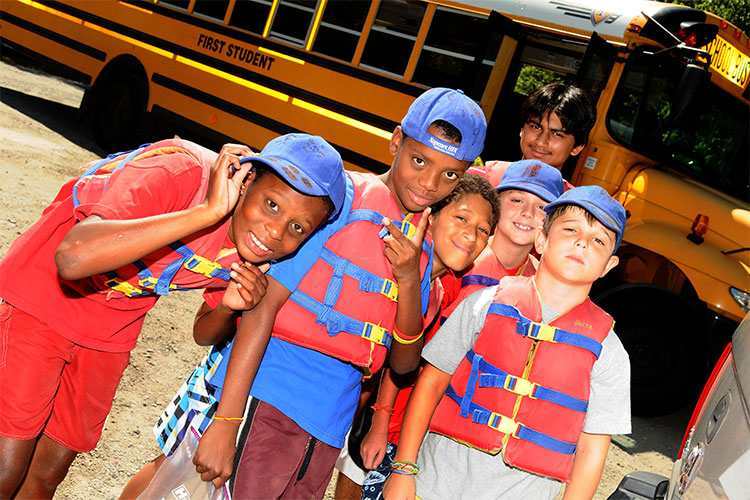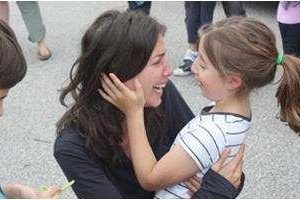Whether you’re choosing a day camp for your child for the first or the tenth time and whether it’s a summer camp, March Break camp, or winter break camp, these frequently asked questions can come up. We turned to Eric Shendelman, vice president of the Ontario Camps Association, for information parents need to ensure their children are happy campers.
Here are five concerns parents have about day camps, answered:
1. What is the best way to transition kids who may be anxious about camp, into a camp situation?
In a day camp setting, if a child has anxiety or is anxious about trying new things or finding their way into new situations, parents need to support their child by bringing him/her to visit with staff (e.g. office directors, program director) ahead of time to allow the child to familiarize him/herself with key figures at camp. Allow the director to review some of the things that will happen and take the child/parent on a tour (if this option is available). The child can see photos or videos that allow them to visualize camp and how they see themselves fitting in for the first time—or for the tenth time. Allow the child to ask questions to add to their comfort level.
As directors and staff at camp, we work very hard to ensure that a child feels the love, comfort and support they require to allow them to thrive in a fun, safe and nurturing environment.
2. What is a reasonable cost for a quality camp and when should parents book?
Cost varies based on what might be included in the fees. Some camps provide specialized programming, transportation, food, knapsacks, t-shirts, photos, taxes etc. And other camps might break those fees up. Some camps may be subsidized and can therefore charge less, whereas some may be private and have to charge more. Camps may have specialized staff that require costs to be passed on to the consumer.
So the topic of cost for camp is a broad one. That said, directing parents to the Ontario Camps Association website helps them get a great start. The OCA has over 300 accredited summer camps in Ontario alone (day camps, residential camps, agency camps, and religious-affiliation camps). There is plenty to choose from. This process of finding the “right” camp can be simplified by listening to friends and family, speaking with directors, visiting camp fairs in your community going on camp tours, checking camp websites. There is so much free information out there to help send your child to the camp that fits like a glove.
3. What safety considerations are there for children with special needs/medical concerns?
So many camps in Ontario accommodate children and youth with special needs and medical concerns. It is very important that parents speak with the camp prior to registration and feel comfortable asking about any of these concerns. Parents need to know exactly who will be caring for their child, how they will be supervised and made to feel safe at all times. Questions parents might ask directors include: Are your staff trained and current in first aid/CPR/EpiPen use? What are the qualifications of the swimming instructors/lifeguards? (If swimming is being offered) and Does your camp have emergency procedures in place in case of an emergency?
Parents must be up front with the camp and disclose any needs a child might have from medical to behavioural. It is very difficult for a camp to accommodate a child with special needs if the information isn’t accurate or complete. Parents should also know that their information is protected by a camp’s privacy policy.
4. What programs and activities should parents look for or expect?
There are many programmes offered by camps. From specialized programming (e.g. a specialized sports or arts programme) to traditional based (a variety of camp activities). No matter the programmes or activities, there must be qualified instructors teaching the programs and there needs to be safety measures included in all aspects. The programmes must be age appropriate and within the ability levels of the campers. Parents will know if the programme is a good fit by the comments the child provides on the first day.
It is helpful for parents to have opportunities to meet with camp staff, directors, swim staff, etc., in an open house setting. Many camps provide these opportunities prior to camp. Or ask the director for a personal tour to get a real sense of the facility and what goes on when the doors open for the season.
5. What are some key questions parents should ask a Camp Director while researching a camp?
- Who is in charge (directors, office managers, section heads, and swim director)?
- Is the camp accredited with an organization (i.e. Ontario Camps Association)?
- Who will care for my child (counsellors, swim instructors etc.)? Are they qualified? What type of training or experience do they have?
- As a parent, I want to know that my child is safe, having fun and given the necessities of camp life (a bathroom, food, water, shelter when needed); can you answer to these points?
- On really hot days or rainy, where will my child be kept safe and comfortable?
- Who can I speak to if I have questions or concerns when my child returns from camp? (There should be a “go-to” person available that a parent can speak with on any topic.)
Most important: camps must be fun, safe, and memorable!!
IMAGE: CHRISTIANA CARE/FLICKR CC
Eric Shendelman is the director of Crestwood Valley Day Camp in Toronto, Ontario. He is a qualified primary, junior, and intermediate teacher, owner of Shendy’s Swim Centre swimming school since 1992), the current vice president of the Ontario Camps Association and a member of the Society of Camp Directors. He is married with two children.




